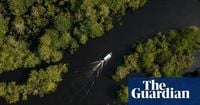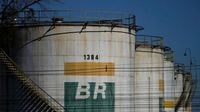Brazil’s recent decision to greenlight exploratory oil drilling near the mouth of the Amazon River has ignited a fierce debate both at home and abroad, pitting economic ambitions against environmental imperatives just weeks before the United Nations COP30 climate summit in Belém. The move, which grants state-run oil giant Petrobras a license to begin drilling in the Foz de Amazonas region, has drawn sharp criticism from environmentalists and Indigenous leaders, while government officials defend it as essential for the nation’s energy sovereignty and economic future.
The license, awarded on October 20, 2025, allows Petrobras to conduct exploratory drilling in Block 59, located approximately 500 kilometers (310 miles) offshore from the mouth of the Amazon River in the northern state of Amapá. According to BBC, drilling is set to commence immediately and will last for five months, with the primary goal of assessing whether oil and gas reserves exist in the area at an economically viable scale. At this stage, there will be no commercial oil production.
The decision comes after a protracted five-year battle for permission, marked by regulatory hurdles and environmental assessments. The Brazilian Institute of Environment and Renewable Natural Resources (IBAMA), the country’s environmental regulator, had initially denied the license in 2023, citing insufficient plans for wildlife protection in the event of an oil spill. However, after a pre-operational environmental assessment in September 2025 and subsequent improvements to Petrobras’s emergency response structures, IBAMA granted the license—though not without controversy.
Environmental groups, Indigenous communities, and climate advocates have expressed deep concern about the timing and implications of the decision. The Amazon region is recognized as one of the planet’s most biodiverse areas, home to about 10% of all known species. The Foz de Amazonas area alone contains 80% of Brazil’s mangroves and is considered a highly sensitive marine ecosystem. Conservationists warn that strong ocean currents could carry any oil spill swiftly into the heart of the Amazon, threatening countless plant and animal species and the livelihoods of riverside and Indigenous populations.
Suely Araújo, a coordinator at the Climate Observatory—a network of environmental nonprofit groups—did not mince words, telling AFP that the government is “sabotaging the leadership it should have at COP30.” She added, “How can our diplomats advocate for the shift away from fossil fuels when the country is intensifying fossil fuel exploration and production?” Araújo previously served as IBAMA’s president and is known for having denied similar drilling licenses to international oil giants in the past.
The Climate Observatory further called the decision “disastrous from an environmental, climate, and sociobiodiversity perspective,” and announced plans to take the Brazilian government to court, citing “illegalities and technical flaws” in the approval process. Their concerns are echoed by Greenpeace, whose co-head of story and communications, Nick Young, argued, “A spill here would be catastrophic and uniquely hard to contain in the Amazon plume. And in addition to the risk of oil spills, the science clearly shows that we cannot afford to burn even existing oil reserves, let alone new ones.”
Indigenous leaders have also stepped forward, demanding that officials at COP30 “nullify oil blocks that have not had the consent of Indigenous people,” halt investment in new oil infrastructure, and create plans to phase out oil and gas operations. Their declaration underscores the tension between Brazil’s international climate commitments and domestic energy policies.
Despite the outcry, President Luiz Inácio Lula da Silva has stood by the decision, emphasizing the economic rationale behind continued oil exploration. In comments to BBC in September, Lula stated, “Brazil is a country that has oil. And possibly we have oil in the Equatorial Margin, and we are making surveys. We’re following the law strictly.” Addressing concerns about potential spills, he added, “If there was a problem or an oil spill, then we will be the ones that are liable and responsible to take care of the problem, if it comes.” Lula also acknowledged the long-term need for a global transition away from fossil fuels: “I am totally in favour of a world one day that will not need any more fossil fuels, but this moment has not come yet. I want to know [of] any country on the planet that is prepared to have an energy transition and can give up fossil fuels.”
Energy Minister Alexandre Silveira echoed these sentiments, celebrating the decision as a way to defend “the future of our energy sovereignty.” He argued on social media, “Brazil cannot give up knowing its potential. We made a firm and technical defense so we can assure that the exploration takes place with complete environmental responsibility, within the highest international standards and concrete benefits for Brazilians.” Silveira further asserted to AFP, “As long as the world demands oil, someone will supply it... Brazil is going to COP with its head held high.”
Petrobras, for its part, has repeatedly stated its commitment to environmental responsibility. The company claims its environmental models show that any oil spill at the offshore site “would not be likely to reach the coast” and that there would be “no direct impact” on Indigenous communities. In a statement, Petrobras president Magda Chambriard said, “We hope to obtain excellent results from this research and prove the existence of oil in the Brazilian portion of this new global energy frontier.” The company also highlighted that Brazil meets most of its energy needs through renewables and exports more than half of its oil, suggesting that new production would not add to Brazil’s own greenhouse gas tally—though critics point out emissions are released globally regardless of where oil is burned.
Nevertheless, the international scientific community remains steadfast in its warnings. The International Energy Agency and leading climatologists have repeatedly stressed that no new oil or fossil fuel projects should be approved if the world is to achieve net-zero global carbon emissions by 2050. Last year was the first on record to exceed 1.5°C above preindustrial temperatures, and the previous decade has been the warmest yet, underscoring the urgency of the climate crisis.
The controversy is further amplified by the broader context of Brazil’s expanding ambitions in the region. In June, Brazil auctioned off several potential land and offshore oil sites near the Amazon River, awarding blocks to major international companies including Chevron, ExxonMobil, and China National Petroleum Corporation. Industry analysts see the area as highly promising, given its geological similarities to neighboring Guyana, which has experienced a boom in offshore oil discoveries in recent years. Yet, this promise comes with high environmental risks, as the region’s strong currents and proximity to sensitive ecosystems heighten the potential for disaster.
As preparations for COP30 intensify, Brazil finds itself at a crossroads—torn between its role as a global climate leader and the economic allure of untapped oil reserves. The outcome of this debate will not only shape the future of the Amazon but could also set the tone for climate negotiations worldwide. For now, the world will be watching closely as the first drills break the surface of the Foz de Amazonas, hoping that Brazil’s promises of environmental responsibility are more than just words.





